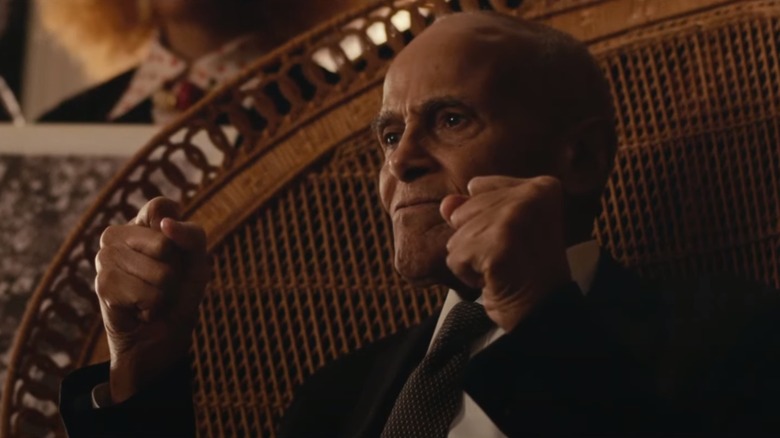Harry Belafonte, Legendary Musician And Actor, Dies At 96
Harry Belafonte, one of the most important and influential Black figures in entertainment, music, and throughout the last century of the civil rights movement, has sadly passed away at the age of 96. The news was first reported by The New York Times and confirmed by Belafonte's spokesman Ken Sunshine, the cause of death resulting from congestive heart failure.
The actor, singer, musician, and activist had most recently appeared in a small but significant supporting turn in director Spike Lee's provocative "BlacKkKlansman" in 2018, where he portrayed a fictionalized civil rights activist. In one of the most pivotal scenes towards the end of the film, Belafonte recounts the horrific real-life lynching of Black teenager Jesse Washington in 1916 and draws a direct parallel to the production of director D.W. Griffith's racist propaganda movie "The Birth of a Nation." The astute choice to cast Belafonte for this particular role speaks to his much wider influence in history, which included Broadway performances, a prolific singing career (including two of his own songs featured in the classic film "Beetlejuice"), and a successful acting career spanning seven different decades in both television and film.
Even more important than becoming one of the first Black leading men in Hollywood, however, Belafonte was a staunch political activist and humanitarian who devoted much of his personal life to battling racial prejudice alongside his close friend and confidant Martin Luther King, Jr. At a time when it was already a deeply profound struggle to make a living in the arts as a Black man, Belafonte committed himself to supporting the civil rights movement throughout the 1950s and '60s and eventually becoming an outspoken critic of the South African apartheid system.
A massive loss, but an even greater legacy
Born Harold George Belafonte, Jr. in March of 1927 to Jamaican parents in Harlem, his incredible life almost feels like a Hollywood story in and of itself. Belafonte served in the Navy during World War II and, after returning to civilian life in New York, developed his love of theater and acting. According to Variety, it was during this time that Belafonte befriended another young and struggling actor by the name of Sidney Poitier, performing at the American Negro Theater and eventually earning his big breakthrough after singing in various nightclubs to help pay for his acting classes. His first major hit came with his album "Calypso" in 1956, leading to the popularization of Caribbean-style music across the United States and culminating in his enduring hit "Banana Boat Song."
Not only did Belafonte's singing talents land him at the top of the charts multiple times, but his wide-ranging career also earned him recognition for a Tony Award for his Broadway performance in 1954, a Primetime Emmy winner in 1960, a Grammy Lifetime Achievement Award in 2000, a SAG Award nominee for his performance in "BlacKkKlansman," and he was even inducted into the Rock and Roll Hall of Fame.
Although his film career never quite took off on a sustained run like his other passions and pursuits, Belafonte dedicated much of his time and energy to social concerns and humanitarian causes in support of the Black community. Although his direct efforts in the civil rights movement are well-documented, he also used his artistry to comment on the issues near and dear to his heart.
A legend until the end, may Harry Belafonte rest in power.
